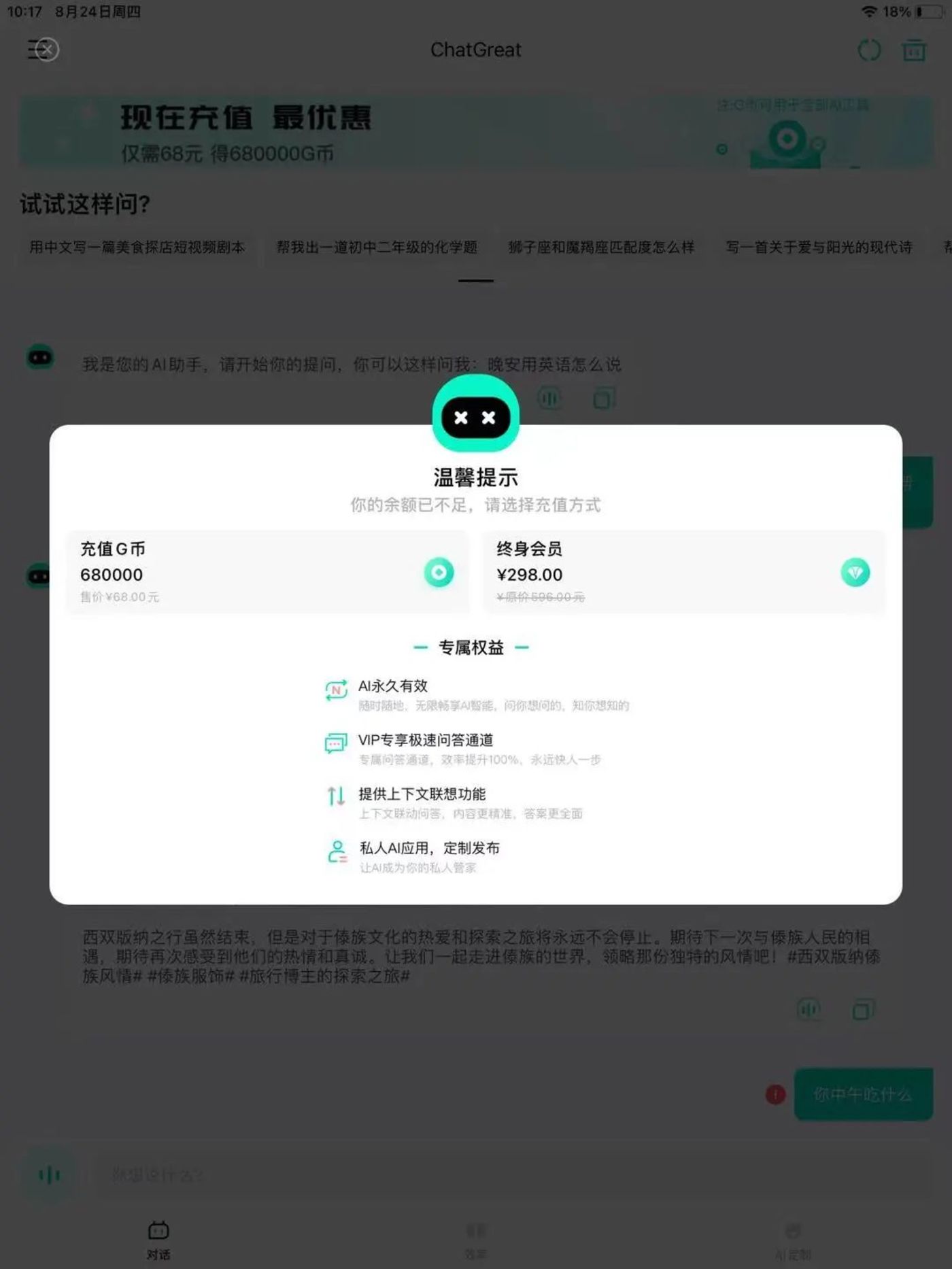Source: IT Times (ID: vittimes), Author: Mao Yu, Editors: Qian Lifu, Sun Yan

Image Source: Generated by Wujie AI
ChatGPT has been in the spotlight for nearly half a year, attracting numerous "gold diggers" in China.
While major internet companies are working hard to develop their own large language models, the app stores are filled with a mix of high imitation AI applications that are profiting heavily. Various "artificial intelligence platforms" and "AI writing applications" in the app stores lure users with tactics like "free trial has been used up, please recharge to continue using."
Xiaoyu (pseudonym), who works in internet operations, told IT Times that she and her colleagues wanted to use ChatGPT to complete some basic copywriting and graphic design work. However, after downloading multiple AI apps from the Apple Store, they were prompted to complete a one-time recharge or become a lifetime member before they could use the apps. "Some apps claim to be ChatGPT in their introductions, but they ask me to recharge before I even try them out, which feels very bad," Xiaoyu mentioned. She also pointed out that the experience of many apps was not good, "It doesn't feel like artificial intelligence, but more like artificial stupidity. I uninstalled them directly."
While artificial intelligence technology is rapidly advancing and benefiting humanity, some dark sides have also emerged, and a trust crisis in AI applications is spreading.
"Insufficient balance, please recharge"
On August 1, OpenAI officially announced that the Android version of ChatGPT had been launched in all supported countries and regions, and users could download it for free. Previously, the iOS version of ChatGPT had landed in the Apple App Store in May this year.
Both the Android and iOS versions of the ChatGPT app have similar functions to the web version. However, the official release of the app undoubtedly makes it more convenient for more people to access and use ChatGPT.
According to the official announcement, OpenAI does not provide ChatGPT services in mainland China, nor has it established a company to operate ChatGPT. However, this does not prevent counterfeit apps from "showing off" in some app stores.
When searching for "ChatGPT" in the Apple App Store, multiple apps with names similar to ChatGPT are displayed, and some app download pages show phrases like "official app" and "Chinese genuine version."
IT Times reporters randomly downloaded ChatGreat, and after experiencing a question, a prompt popped up on the interface: "Your balance is insufficient, please choose a recharge method." One method is to recharge with G-coins for 68 yuan each time, and the other is to become a lifetime member, which costs 268 yuan and includes "unlimited questions" and "VIP fast channel" services.

At the same time, another app called AI Chat displayed phrases like "unlock all software functions," "28 yuan for a quarter," and "evaluate for a free trial" as soon as the reporter entered the page. In the app's Apple Store comment section, there were nearly 31,000 comments, and many of them did not show valid information.
In addition to the above-mentioned apps, an app named "ChatGTP" is "counterfeiting" in the Apple Store, with an app icon that differs only in color from the official ChatGPT, and the description claims it is the "official Chinese version of AI chatbot." Most of the 529 comments are negative, with statements such as "I was prompted for a successful deduction even though I hadn't even linked my email," "After purchasing, it still shows that I am not a member. Contacting customer service, they said I couldn't get a refund because I hadn't linked my email," and "I was prompted for a successful deduction after just clicking on the monthly membership, and after the deduction, I still couldn't use it normally." The app's rating is only 2 points.
In response, IT Times reporters called Apple Store's official customer service. The customer service representative told the reporter, "If overseas apps are not available in China, they cannot be found in the Apple Store." When the reporter asked the customer service representative again how the related apps that are easily confused with ChatGPT in the Apple Store were approved for listing, the customer service representative said they would forward the question to higher authorities and also gave a reminder: "You can confirm whether there has been any payment activity through 'Settings-Apple ID-Subscriptions,' and if automatic payment is found, you can close it in time."
On July 31, the Apple Store announced the centralized removal of a large number of apps providing ChatGPT services in the Chinese region. In the response given to app developers, Apple officials stated that the related apps contained illegal content, and providers of deep synthesis technology must meet the operating license requirements in China, including obtaining a license from the Ministry of Industry and Information Technology, but the aforementioned apps related to ChatGPT did not obtain a license.
Previously, Alipay's Security Center had issued a security alert stating, "Criminals are taking advantage of the popularity of ChatGPT to offer ChatGPT account registration services and counterfeit versions of ChatGPT apps online, and are profiting illegally. Using free trials as a gimmick, they attract users to register and use the service, and then charge for usage based on the number of times or collect membership fees."
The Chinese and foreign "big players" behind the apps
Not only in the Apple Store, various indistinguishable AI apps are also spreading on other social platforms.
Nana (pseudonym), an internet practitioner who runs her own offline brand in her spare time, sensed a business opportunity when ChatGPT emerged. "Inspired by ChatGPT, we launched an AI mini-program for our brand at the beginning of the year," Nana told IT Times reporters. Currently, the mini-program has not yet reached the profit stage and is only used as an online benefit to attract and maintain offline customers. On the other end of the mini-program, it is connected to a large model from a domestic company.
"In fact, domestic big companies have not been able to reproduce ChatGPT exactly the same. The cost, time, and manpower involved are not something that small companies can afford. Therefore, most AI products on the market are connected to the large language models of big companies, such as Baidu's Wenxin Yiyuan, or directly connected to ChatGPT," Nana said. Directly connecting to existing large models will greatly save costs and manpower. The mini-program in her store is connected to a large model from a domestic company, not ChatGPT. The initial version was developed in just two weeks, with two developers working behind the scenes, and it took less than three days from review to going online.
The "Interim Measures for the Administration of Generative Artificial Intelligence Services" that was recently implemented stipulates that if the provision of generative artificial intelligence services from overseas to China does not comply with laws, administrative regulations, and the provisions of these Measures, the Cyberspace Administration of China shall notify relevant institutions to take technical measures and other necessary measures for disposal.
"We only submitted the mini-program as an application tool for initial review and did not link it to ChatGPT," Nana mentioned. If an AI mini-program goes online, the WeChat official platform review will be relatively strict. In addition to checking whether the code contains services that access user privacy data without user authorization, they will repeatedly verify and confirm with the manufacturer whether the mini-program is connected to ChatGPT, "because the domestic application's connection to ChatGPT is a violation, but currently the major platforms do not have very strict regulatory measures. We also tried to go online on other platforms, and the review there is more lenient."
IT Times reporters tried to search for "ChatGPT" in WeChat mini-programs, and the page prompted "No relevant mini-programs are available, you can try changing the search term." When the reporters searched for "AI writing" again, more than 30 related mini-programs popped up, but it was impossible to judge whether they were qualified AI applications based on the literal meaning and style. After randomly selecting one for three experiences, it showed that "membership of 19.9 yuan is required to use."
The reporter called the customer service number of the mini-program's developer, and the staff told the reporter that the mini-program was indeed connected to ChatGPT, but on top of the connection, the developers had also implanted more diverse copy templates, so the copy was more refined than the original large language model. However, the staff advised that if you need to purchase a membership, it is best to do so on the same day, as "the mini-program will double the charge the next day due to template updates." The staff did not provide any explanation on how to pass the platform review.
In addition to membership fees, there are also advertisements
"At present, the profit model of AI mini-programs and applications, in addition to membership fees, also includes the ability to earn short-term profits through advertising," said Cheng Tian, an AI mini-program developer, to IT Times reporters.
"Patch ads or video ads are quite common now. I know of a development team of less than 5 people doing AI mini-programs, and the estimated monthly advertising revenue can reach 100,000 yuan. In addition, the more common practice in the market is to charge for membership, providing users with 5 or 10 free conversation opportunities per day. After ChatGPT was upgraded from 3.0 to 4.0, the free usage opportunities provided to users may be limited to 3 times, because 4.0 also limits the usage times for manufacturers," Cheng Tian mentioned. The cumulative advertising and membership revenue has far exceeded the operating costs behind the app, "because it is a generative dialogue application, unless you want to expand into other customized profit models such as point systems or training, there is no need for dedicated personnel to operate it."
Publicly available information shows that it is not difficult to connect to ChatGPT. To access the genuine ChatGPT AI language model, two servers are required, one overseas and one in China, to call the ChatGPT interface from the overseas server and return it to the Chinese server. This method has high costs and good user experience. However, judging from the user experience of various domestic platform applications, many apps are only connected to limited large models, with limited expressive abilities, but lower development costs.
How to unlock the "true face" of AI? Based on experience, Cheng Tian offered some suggestions: "When users download related apps, they should not recharge or pay first, and can test the AI with 1-2 non-professional questions. For example, questions like 'How should I behave on a blind date for the first time?' 'What should I pay attention to when traveling to Dubai?' which have no standard answers. A real AI large model application will give its own answers, while a human customer service will prompt 'unable to answer at the moment' or 'currently upgrading,' etc."
SensorTower's recent report "Insights into the AI Application Market in 2023" shows that with the release of ChatGPT in early December 2022, the AI+Chatbot race has quickly heated up. In the first half of 2023, there were over 200 AI+Chatbot applications in the market, with downloads exceeding 170 million times.
In the fiercely competitive AI race, the "gold-digging" stories are far from over.
免责声明:本文章仅代表作者个人观点,不代表本平台的立场和观点。本文章仅供信息分享,不构成对任何人的任何投资建议。用户与作者之间的任何争议,与本平台无关。如网页中刊载的文章或图片涉及侵权,请提供相关的权利证明和身份证明发送邮件到support@aicoin.com,本平台相关工作人员将会进行核查。




